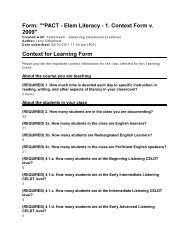The Tutoring Book - California State University, Sacramento
The Tutoring Book - California State University, Sacramento
The Tutoring Book - California State University, Sacramento
Create successful ePaper yourself
Turn your PDF publications into a flip-book with our unique Google optimized e-Paper software.
Your Safari Guide to <strong>Tutoring</strong> Advanced Writers<br />
53<br />
Rebecca Parker<br />
Spring 2011<br />
So, safari hunter, you think you’re hot stuff. You are a tutor. You are the expert, the giver of knowledge,<br />
the advanced writer who knows how to write a darn good essay. You have wrangled Freshman into<br />
reading their essays out loud and have observed Sophomores working on transitions in their native<br />
habitat. You just got told that your next session is with a graduate student. And now you don’t know what<br />
to do.<br />
Once you’re done hyperventilating and wringing your hands, here’s some facts for you. Graduate<br />
students don’t have sharp teeth. Most graduate students who come to the Writing Center are either dropins,<br />
have one-time appointments, or are working on a very specific project that they will only need help<br />
with for a few weeks, though sometimes they will be working on their thesis all semester. Working with<br />
graduate students is the opposite of confronting a pride of lions. It can be fun and easy.<br />
Graduate students know how to be students. And you know how to be a tutor. <strong>The</strong>y assume that<br />
because you are a tutor in the Writing Center, you will be able to help them. <strong>The</strong>y assume correctly. I’ve<br />
never had a graduate student ask to work with someone older or more experienced. To them, you are the<br />
wise trail guide.<br />
You usually don’t have to worry about graduate students being lazy during the tutoring session.<br />
While with other students/monkeys you might have to be careful they’re not trying to trick you into doing<br />
their work or editing for them, graduate students are used to doing work themselves. <strong>The</strong>y are in the<br />
graduate program because they know how to work hard and be a diligent student. So if you point out a<br />
grammatical mistake in their paper, they are more likely to take the initiative to see if they made the same<br />
mistake anywhere else.<br />
Sometimes, graduate students want help navigating the Amazon River. Most often, however,<br />
graduate students want help with organization, grammar, and clarity. <strong>The</strong>se are things you know how to<br />
do; the basics are the same. Does this sentence make sense? Do these ideas flow clearly? Is this paper<br />
drowning in commas? Can you help me get this thorn out of my paw?<br />
Before you think that graduate students are all cuddly koala bears, let me remind you that they are<br />
human after all. <strong>The</strong>y might be upset about feedback they have gotten on their thesis. <strong>The</strong>y might feel like<br />
their years of jungle exploration mean no one should tell them how to write anymore. <strong>The</strong>se types of<br />
students are usually never upset at you; they just want to vent. <strong>The</strong>y’re not going to bite your head off. It’s<br />
okay to start the session with five minutes of griping if that’s what the writer needs to do. Once they get<br />
their frustration out of their system, the two of you can get to work.<br />
Now, you might be worried because graduate students have been exploring the jungle a lot longer<br />
that you, and the idea of helping someone with their thesis paper feels like climbing a volcano in the dark.<br />
Don’t fret! For thesis papers, graduate students have a professor advisor in their department also looking<br />
over their papers. This person looks into the technical aspects of the graduate student’s paper. So if their<br />
paper is about engineering, and the only thing you’ve ever engineered is a well-written essay, have no<br />
fear. If they do ask you a technical question you don’t know how to answer, feel free to reveal your<br />
ignorance and refer them back to their advisor. <strong>The</strong> graduate student doesn’t need your help with the<br />
technical aspects, and they don’t usually expect it. <strong>The</strong>y know, and you should too, that you have a<br />
different, equally important role.<br />
You may not be the lion tamer, the zebra wrangler, or the highly experienced safari leader when<br />
working with graduate students. Instead, you are the tourist on this safari. You are the dumb reader, the<br />
supportive tutor, another invested set of eyes looking at their paper. Remember that the graduate student<br />
already has at least two other people in their department looking at their paper, their advisor and a<br />
committee member. <strong>The</strong>y come to the Writing Center because they want a fresh set of eyes. And your<br />
eyes are trained to look at grammar, for clarity, and at organization. It is of great benefit that you probably<br />
have no idea what they’re talking about. Because they know what their jargon means they might get<br />
caught up in explaining things in a technically correct way. Your job is to say, “I don’t know what a

















